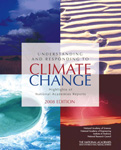|
|
|
|
|
|
|
News & Views item - May 2010 |
![]() US National Academies' National Research Council (NRC) Issue Congressionally
Requested Reports on Anthropogenic Climate Change. (May 20, 2010)
US National Academies' National Research Council (NRC) Issue Congressionally
Requested Reports on Anthropogenic Climate Change. (May 20, 2010)
 Ralph
Cicerone, president of the US National Academy of Sciences (NAS), introduced the
publication of three reports by the Academy -- which were more than 2 years in
the making and involved 90 scientists, engineers, business people and
politicians -- saying: "This is our most comprehensive report ever on climate
change... [it] analyses the reality of climate change and how should the nation
respond. ... It emphasizes why the United States should act now."
Ralph
Cicerone, president of the US National Academy of Sciences (NAS), introduced the
publication of three reports by the Academy -- which were more than 2 years in
the making and involved 90 scientists, engineers, business people and
politicians -- saying: "This is our most comprehensive report ever on climate
change... [it] analyses the reality of climate change and how should the nation
respond. ... It emphasizes why the United States should act now."
Stanford University's environmental scientist Pamela Matson who chaired of the NRC panel on advancing the science of climate change said bluntly: "Climate change is occurring. Earth is warming. These climate changes are largely caused by human activities... Climate change is already having consequences."
It should be noted that the new reports, totalling 823 pages, draw from the past 5 years of research that was completed too late to be included by the IPCC in its report. They also drew on earlier NAS efforts and more than a score of reports from the U.S. Global Change Research Program. Furthermore, the three NRC panels consisted of a different group of scientists from those who compromised IPCC.
As to the recommendation in the second report that grew out of the analysis: "[A] reasonable representative range for a domestic emissions budget" would correspond "roughly to a reduction of emissions from 1990 levels by 80% to 50%" by 2050.
The 80% reduction would be similar to the 2050 goal favoured by the Obama Administration and by some members of the US Congress.
Economist Robert Fri of Resources for the Future who chaired the panel responsible for the recommendation noted: "meeting that emissions budget is a challenging task. We can't get there by just deploying what we know how to do." His succinct summary: New technologies must be developed along with increasing energy efficiency, expanding low-carbon energy sources, expanding nuclear energy in a viable way, and retrofitting old technology.
While adapting to the impacts of climate change, is the subject of the third NRC report, it is in fact light on specific recommendations suggesting that specific local conditions will need to be considered. However, it urges that contingency planning should begin for severe effects, such as a meter or more rise in sea-level along the US Gulf Coast, which would necessitate the relocation of people and their infrastructure.
Click to access the reports and a video overview